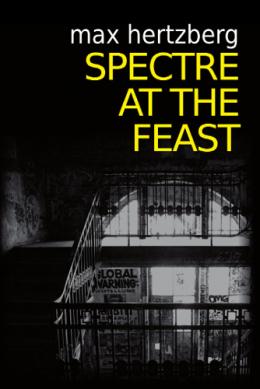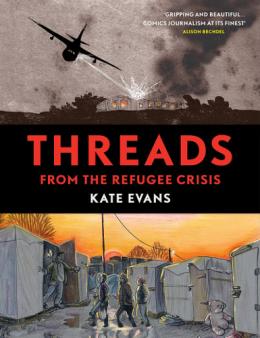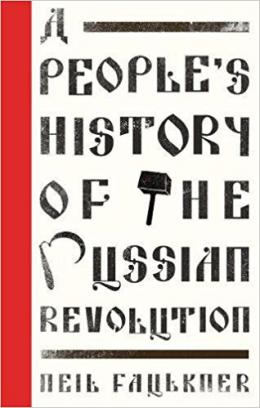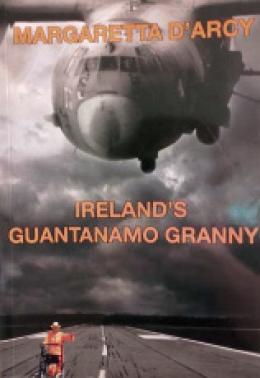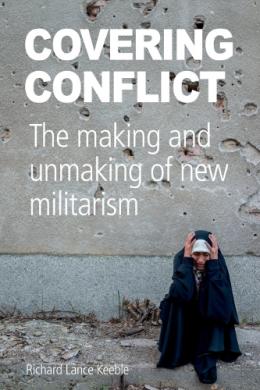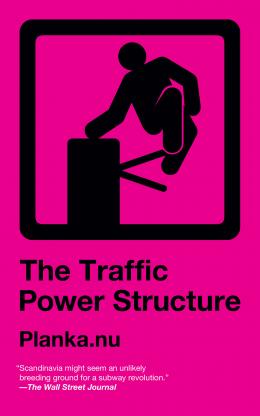In this, the third thriller in Max Hertzberg’s alternative East Germany trilogy (set in an alternate history in which East Germany’s Peaceful Revolution of 1989 resulted in the creation of a socialist state run by direct democracy), the young, self-organised democracy is testing its self-confidence and looking to the future, while threatened by ghosts from its past that just won’t lie down. It’s a year on from a crucial referendum to take down the Berlin Wall and disband the Republicschutz, a temporary counter-espionage service formed to…
Reviews
Kate Evans has created beautiful, radical comic strips since the 1990s. She has drawn and written about her experience as a tree protester at the Newbury Bypass, climate change, pregnancy and breastfeeding and the life of Rosa Luxemburg.
Threads came about as the result of a trip to volunteer at the Jungle refugee camp in Calais in October 2015, followed by two further trips in January and February 2016. The graphic novel documents Evans’ experiences in the camp, and the friendships that she made with the people living…
In October, I travelled to Burnley for the trial of Sam Walton and reverend Dan Woodhouse (see p1). Walking to the court past derelict industrial buildings and rows of empty shops and pubs, I couldn’t help think of the Women’s Peace Crusade meetings held here exactly 100 years ago.
According to this short book, Burnley was once called ‘the largest producer of woven cotton in the world’ but, by the First World War, its economy had slumped. Over 4,000 young men from Burnley were killed at the front, with over 100 dying in a single…
The concept of meritocracy – ‘a system structured around advancement of people who are selected on the basis of individual achievement’ – has been a powerful idea in post-war industrialised societies, especially in the more economically-unequal US and UK.
As with its close cousin ‘equality of opportunity’, meritocracy has ‘become the key means of cultural legitimation for contemporary capitalist culture’, endorsed by Margaret Thatcher, Tony Blair and now Theresa May. So argues Jo Littler, a sociologist at City, University of…
‘The Jungle’ was the name given to a refugee and migrant encampment near Calais. It is an emotional and cathartic experience to hear at last what it was like for the residents in their own words and pictures, rather than from journalists and volunteers, however sensitive.
Just before its demolition by the French authorities in October 2016, when riot police were closing down businesses and residents were being dispersed to ‘welcome centres’ across France, I was lucky enough to meet Babak Inaloo, a writer and resident of the camp…
Reviewers agree that Neil Faulkner’s A People’s History of the Russian Revolution is a lively and readable account of the revolutionary events of 1917. It is also a distorted, dishonest disservice to the millions of Russian workers and peasants whose achievements Faulkner claims to celebrate.
Why should this matter to activists today? In particular, why should it matter to people committed to nonviolent revolution?
One reason is that when times get tough, and social conflicts get hotter, and people really…
If there was ever a book that should be reviewed in Peace News this is it. Not only is 83-year old Margaretta D’Arcy a lifelong campaigner for peace but it was Peace News that drove her, at 79, to climb the fence at Shannon airport and protest on the runway – not once, but twice:
‘On the whole in the anti-war movement there was no real support for non-violent direct action. But then Peace News carried an article about an international week of protest against drones to coincide with World Peace Day on 21…
Sean Michael Wilson’s latest non-fiction comic book – written in conjunction with the political philosopher Brad Evans – surveys a wide variety of thinking about violence, by 10 figures from the 20th and 21st centuries, ranging from Hannah Arendt and Franz Fanon to Judith Butler and Noam Chomsky.
Unfortunately, most of the treatments are – perhaps necessarily, given their brevity – fairly superficial. I suspect that some of the showcased thinkers (for example Judith Butler) have little of value to offer.
There are…
Meticulously sourced and based on extensive primary research, this book recounts a neglected thread of queer history.
Scott-Presland states that he kept in mind the encyclopedic regimental histories which line the walls of the Imperial War Museum. Notwithstanding this militaristic metaphor, there is a great deal in these pages from which peace campaigners might learn. The Campaign for Homosexual Equality (CHE) was founded in 1964. At its height, it had 5,000 members and over 100 local groups. Nevertheless, it has been largely…
The Precarious Workers Brigade (PWB) is a UK-based activist group of precarious workers in the culture and education sectors who highlight and expose exploitative labour practices. This manual is an information resource for educators teaching ‘employability’ and ‘work-based learning’. It also serves well as a resource for students and for people seeking their first job, internship or placement.
In her brief foreword, the Italian-American scholar, teacher, activist and Marxist-feminist Silvia Federici, reminds us that universities…
The scope of Covering Conflict cannot be overstated. Drawing from a dizzying array of sources throughout – interviews with journalists, theoretical approaches, autobiographies, biographies, histories, academic journals, newspapers, magazines and mainstream and alternative websites – it is well-written, well-argued and meticulously referenced. For PN readers it is an extremely valuable resource, and should be a compulsory read for all journalists.
In this book, Richard Keeble draws on over 25 years of research to…
John Perceval, son of the only British prime minister to have been assassinated, was committed to a lunatic asylum in 1830. Perceval’s Quest is an exploration of the circumstances and consequences of that incarceration, using as a basis Perceval’s own fascinating account of his experiences.
At the core of Perceval’s writings are modern concerns about mental health, and how a family and society interacts compassionately with an individual having very different perceptions of reality. Robin Holtom, with his background as…
Annie Sprinkle describes herself as a feminist porn activist, ecosexual and radical sex educator. With Beth Stephens, she has pioneered the ecosexuality movement – the eroticising of nature by coming into relationship with the earth, showing our natural partner the same love, care and respect we would a lover. Although some may consider this odd, she reminds us that really ‘all sex is eco sex, as we are really part of, not separate from, nature.’ However, this book focuses more on Sprinkle’s work educating people about the orgasm and its…
As a non-motorist by choice, I found much to like in this slim book, once I’d got past its very dull title. It’s written by a Swedish group whose name – Planka.nu – translates roughly as ‘fare dodge now’. To my mind this would have been a very much snappier title.
According to Wikipedia, ‘Planka Nu is a network of organisations promoting tax-financed zero-fare public transport...The campaign has received much attention because [it] encourages people to fare-dodge, aiding its members in paying penalty fares through the insurance…
As a young man in the USA in the 1960s, Jonathan Lerner left university and became part of a radical group, Weatherman, a faction of the organisation Students for a Democratic Society (SDS).
Eventually forced underground, Weatherman (later renamed the Weather Underground Organisation) managed to not only destroy SDS but also many of its own members’ lives.
As a 13-year-old, Lerner had joined a picket line at a local apartment building so he could get to know ‘the cool kids’. While at university, he staged a guerilla…


